- Clone
- 51.1 (See other available formats)
- Regulatory Status
- RUO
- Other Names
- R3G1
- Isotype
- Mouse IgG2b, κ
- Ave. Rating
- Submit a Review
- Product Citations
- publications
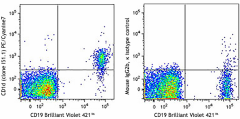
-

Human peripheral blood lymphoyctes were stained with CD19 Brilliant Violet 421™ and CD1d (clone 51.1) PE/Cyanine7 (left) or mouse IgG2b, κ PE/Cyanine7 isotype control (right).
| Cat # | Size | Price | Quantity Check Availability | Save | ||
|---|---|---|---|---|---|---|
| 350309 | 25 tests | 147 CHF | ||||
| 350310 | 100 tests | 382 CHF | ||||
CD1d is a MHC-like, type I transmembrane protein, member of the CD1 family and the immunoglobulin superfamily. On the cell surface, CD1d forms a heterodimer with β2-microglobulin. CD1d is expressed by antigen-presenting cells such as B cells, monocytes/macrophages, dendritic cells, and some non-lymphoid cells. Cortical thymocytes express CD1d but the expression is lost in mature T cells. CD1d presents lipid antigens to iNKT cells analogous to MHC molecule presentation of peptides to T cells.
Product DetailsProduct Details
- Verified Reactivity
- Human
- Reported Reactivity
- Cynomolgus
- Antibody Type
- Monoclonal
- Host Species
- Mouse
- Immunogen
- Human CD1d-Fc fusion
- Formulation
- Phosphate-buffered solution, pH 7.2, containing 0.09% sodium azide and BSA (origin USA)
- Preparation
- The antibody was purified by affinity chromatography and conjugated with PE/Cyanine7 under optimal conditions.
- Concentration
- Lot-specific (to obtain lot-specific concentration and expiration, please enter the lot number in our Certificate of Analysis online tool.)
- Storage & Handling
- The antibody solution should be stored undiluted between 2°C and 8°C, and protected from prolonged exposure to light. Do not freeze.
- Application
-
FC - Quality tested
- Recommended Usage
-
Each lot of this antibody is quality control tested by immunofluorescent staining with flow cytometric analysis. For flow cytometric staining, the suggested use of this reagent is 5 µl per million cells in 100 µl staining volume or 5 µl per 100 µl of whole blood.
- Excitation Laser
-
Blue Laser (488 nm)
Green Laser (532 nm)/Yellow-Green Laser (561 nm)
- Application Notes
-
Additional reported application (for the relevant formats) include: immunohistochemical staining of frozen tissue sections1, Western blotting1,2, and induction of IL-12 production by crosslinking of CD1d3.
-
Application References
(PubMed link indicates BioLegend citation) -
- Exley M, et al. 2000. Immunology 100:37. (IHC, WB)
- Durante-Mangoni E, et al. 2004. J. Immunol. 173:2159. (WB)
- Yue SC, et al. 2005. P. Natl. Acad. Sci. USA 102:11811. (Stim)
- RRID
-
AB_2562407 (BioLegend Cat. No. 350309)
AB_2562407 (BioLegend Cat. No. 350310)
Antigen Details
- Structure
- MHC-like, type I transmembrane protein, member of the CD1 family and the immunoglobulin superfamily
- Distribution
-
Expressed by cortical thymocytes, monocytes, macrophages, dendritic cells, B cells (highly expressed on marginal zone B cells in particular), and in some non-lymphoid cells
- Function
- Present lipid antigens to iNKT cells
- Ligand/Receptor
- When loaded with a lipid, is recognized by the Vα14i TCR from iNKT cells
- Cell Type
- B cells, Dendritic cells, Macrophages, Monocytes, Thymocytes
- Biology Area
- Immunology, Innate Immunity
- Molecular Family
- CD Molecules, MHC Antigens, TCRs
- Antigen References
-
1. Koch M, et al. 2005. Nat. Immunol. 6:819.
2. Liu X, et al. 2010. P. Natl. Acad. Sci. USA 107:13010.
3. Zeissig S, et al. 2010. J. Clin. Invest. 120:2889.
4. Teige A, et al. 2010. J. Immunol. 185:345. - Gene ID
- 912 View all products for this Gene ID
- UniProt
- View information about CD1d on UniProt.org
Related FAQs
Other Formats
View All CD1d Reagents Request Custom Conjugation| Description | Clone | Applications |
|---|---|---|
| Purified anti-human CD1d | 51.1 | FC,IHC-F,IP,Stim,WB |
| PE anti-human CD1d | 51.1 | FC |
| APC anti-human CD1d | 51.1 | FC |
| PE/Cyanine7 anti-human CD1d | 51.1 | FC |
| PerCP/Cyanine5.5 anti-human CD1d | 51.1 | FC |
| Brilliant Violet 510™ anti-human CD1d | 51.1 | FC |
| Brilliant Violet 421™ anti-human CD1d | 51.1 | FC |
| TotalSeq™-A0164 anti-human CD1d | 51.1 | PG |
| TotalSeq™-C0164 anti-human CD1d | 51.1 | PG |
| Ultra-LEAF™ Purified anti-human CD1d | 51.1 | FC,IHC,IP,Stim,WB,Block |
| TotalSeq™-B0164 anti-human CD1d | 51.1 | PG |
Customers Also Purchased
Compare Data Across All Formats
This data display is provided for general comparisons between formats.
Your actual data may vary due to variations in samples, target cells, instruments and their settings, staining conditions, and other factors.
If you need assistance with selecting the best format contact our expert technical support team.
-
Purified anti-human CD1d
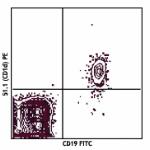
Human peripheral blood lymphocytes stained with CD19 FITC an... 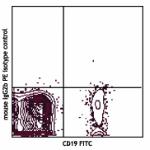
-
PE anti-human CD1d
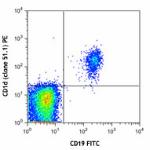
Human peripheral blood lymphocytes were stained with CD19 FI... 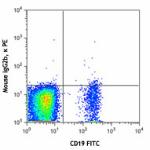
-
APC anti-human CD1d
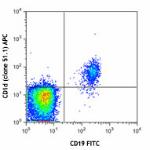
Human peripheral blood lymphocytes were stained with CD19 FI... 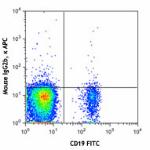
-
PE/Cyanine7 anti-human CD1d

Human peripheral blood lymphoyctes were stained with CD19 Br... -
PerCP/Cyanine5.5 anti-human CD1d

Human peripheral blood lymphocytes were stained CD19 Brillia... -
Brilliant Violet 510™ anti-human CD1d
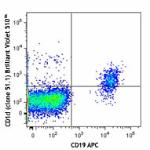
Human peripheral blood lymphocytes were stained with CD19 AP... 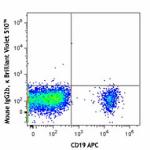
-
Brilliant Violet 421™ anti-human CD1d
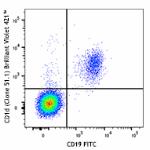
Human peripheral blood lymphocytes were stained with CD19 FI... 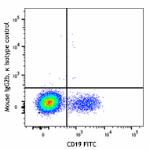
-
TotalSeq™-A0164 anti-human CD1d
-
TotalSeq™-C0164 anti-human CD1d
-
Ultra-LEAF™ Purified anti-human CD1d

Human peripheral blood lymphocytes stained with CD19 FITC an... 
-
TotalSeq™-B0164 anti-human CD1d
 Login / Register
Login / Register 










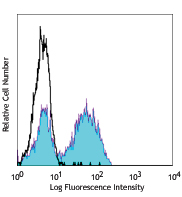
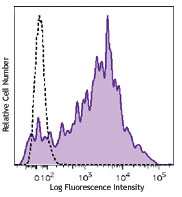
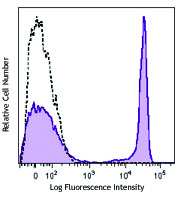
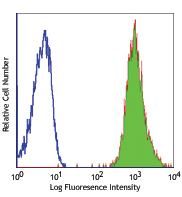



Follow Us